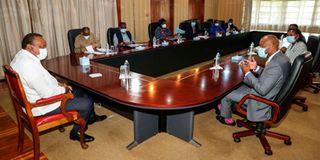Use AfCFTA to boost trading

President Uhuru Kenyatta when he met African Continental Free Trade Area (AfCFTA) Secretary General Wamkele Mene at Sagana State Lodge in Nyeri County.
What you need to know:
- Intra-Africa trade has not been embraced by all countries, with regional economic hubs blamed.
- The World Bank estimates that, by 2035, AfCFTA could boost Africa’s exports by 29 per cent.
The recent meeting between the Comesa Secretariat, member states and other regional economic communities (RECs) under the African Continental Free Trade Area (AfCFTA) is a step in the right direction.
They discussed the integration of informal trade in animals and animal products into formal trade and access to information on available market opportunities and market potentials within the region.
But intra-Africa trade has not been embraced by all countries, with regional economic hubs blamed. From 2015 to 2017, it was two per cent of exports and imports while America, Asia, Europe and Oceania were 47, 61, 67 and seven per cent, respectively.
The 2019 “Economic Development in Africa” report shows applied tariff rates to intra-regional economic community members amount to 7.4 per cent in the Community of Sahel-Saharan States (CEN-SAD), 5.6 per cent in Ecowas, 3.8 per cent in SADC and 2.6 per cent in the Arab Maghreb Union (AMU).
Unctad statistics also show that, from 2010 to 2019, the shre of intra-Africa exports in Africa’s exports as 15 per cent while regional figures for America were 55 per cent, Asia 60 per cent and Europe 69 per cent.
The World Bank estimates that, by 2035, AfCFTA could boost Africa’s exports by 29 per cent, intra-continental trade by more than 81 per cent and exports to the rest of the world by 19 per cent, all pegged on manufacturing sector growth. Africa Union Commission’s Agenda 2063 aims for an economically integrated continent by 2063.
For Africa to reinvigorate its economy, the export side of the business must be taken seriously with measures such as sound macro-economic policy reforms to catapult sustainable development taken.
Intra-Africa investment will make Africa an industrialised continent hence an improvement of international trade, terms of trade, the balance of trade, and balance of payment. And above all, it will end the vicious cycle of poverty, unacceptably high level of unemployment rates, and economic meltdown.
Mr Muthama, business management and strategic management lecturer at JKUAT, is a management consultant and author. [email protected].





